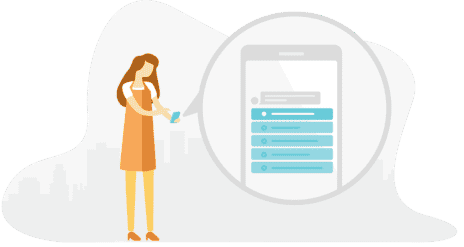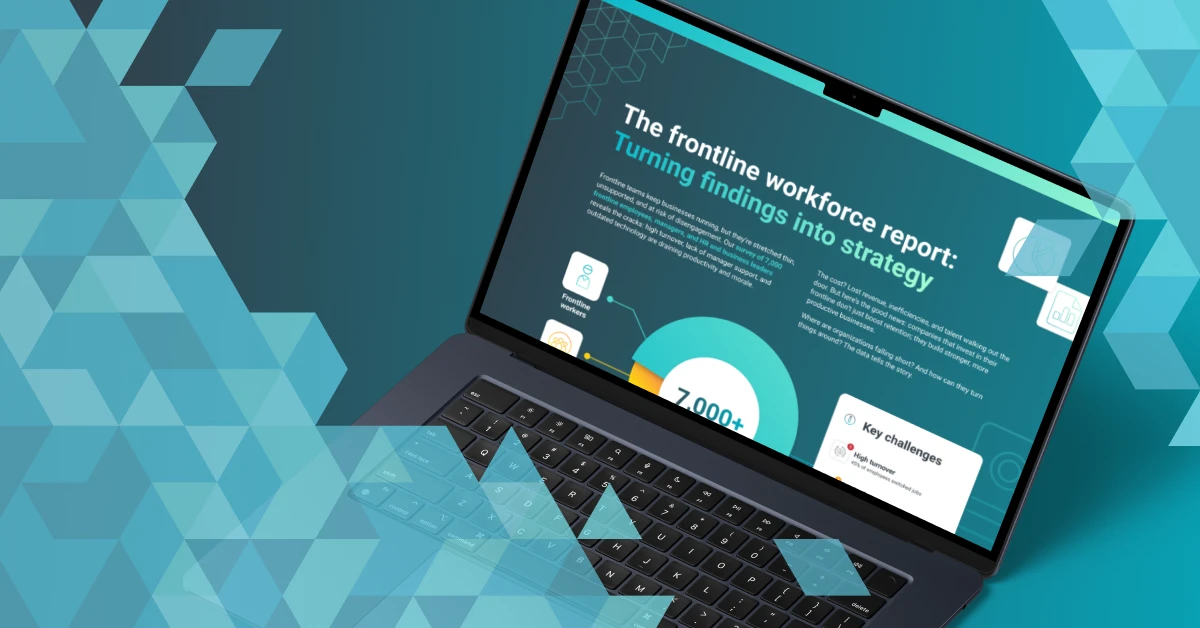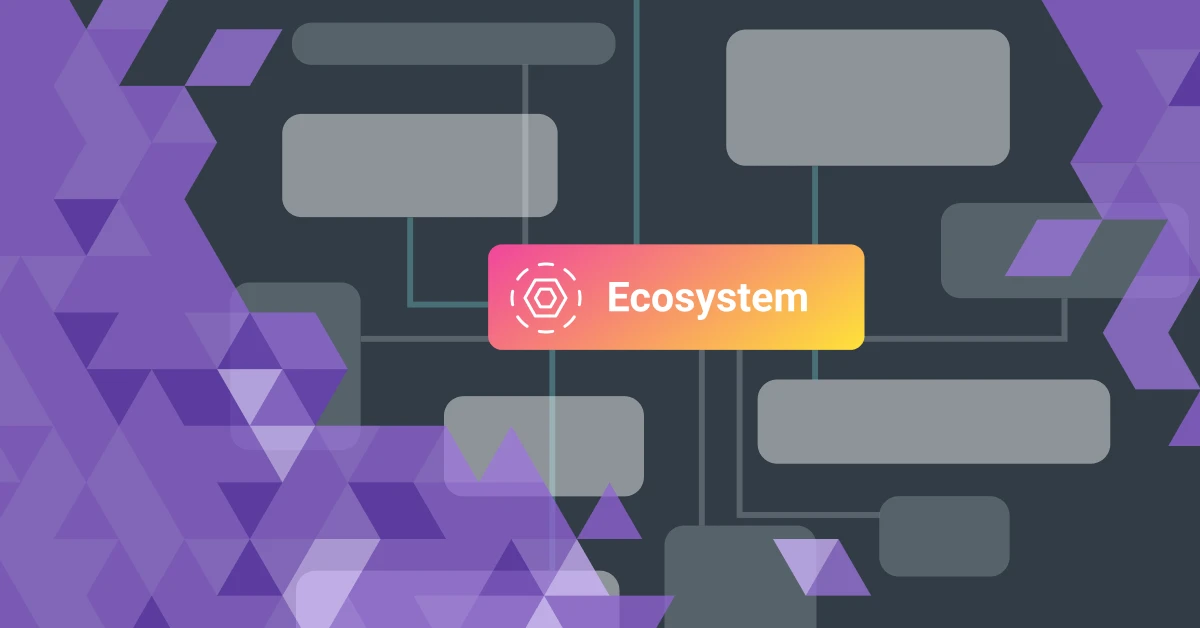Retail Training | The Competitive Edge Your Business May Be Missing

Table of contents
- What Is Retail Sales Training?
- Starting from the beginning: what is retail sales training?
- Why Training Matters In Retail
- 4 Types Of Retail Sales Training
- Measuring & Improving Your Retail Sales Training
- Addressing Challenges In Retail Sales Training
- Creating Training And Communication Experiences That Matter
The retail industry is constantly evolving, especially in our post-pandemic world. The secret sauce to keeping up with it all? A solid retail training program for associates.
Retail trends show the industry is in the middle of a digital revolution. By 2040, 95% of purchases are expected to be done online. And, currently, 65% of e-commerce traffic comes from mobile users.
This means retail sales training – especially for the digital world – is more important than ever. Your new hires need product knowledge, digital tools, and mobile access to help your retail business stay ahead of the curve.
Ready to learn the ins and outs of building a retail training program? Let’s get started!
What Is Retail Sales Training?

Starting from the beginning: what is retail sales training?
Retail sales training provides retail employees with tools, techniques, and information to create successful customer experiences and improves sales.
Training for retail sales associates can provide massive benefits to any retail organization, such as:
- Elevated employee satisfaction
- Deepened product knowledge
- Increased sales
- Improved customer relationships
- A motivated and empowered customer-first culture
Why Is Retail Sales Training Necessary?
Did you know 55% of sales employees don’t have the skills to be successful? Yet, continuous training boosts sales by 50%?
Retail is a competitive industry in itself. So, ensuring your employees are well-trained in your products, techniques, and customers is a competitive advantage that will bring in more business.
What Should Retail Sales Training Involve?
When designing the retail sales training experience, it’s important to start with what you want your employees to get out of it.
Do you want sales associates to be able to answer any customer question? Or, do you want them to focus on upselling tactics?
These are all important questions to ask yourself when deciding what you want to cover in your retail sales training program.
Once you know your topics, think about the delivery. Salespeople will likely want person-to-person interaction, so practice scenarios will go a long way. And, they’ll also appreciate informative sessions to learn the products.
Either way, your retail sales training approach will be moving in the right direction when you plan out:
- What topics you want to cover in your training
- What topics your employees will be most interested in
- What training methods work best
- What platform you need to communicate with employees
Why Training Matters In Retail

In retail, first impressions are everything. And every retailer wants to create a lasting, positive experience for customers that keeps them coming back.
This is why retail sales training is so important.
Frontline retail sales associates are the heart of your business because they interact directly with customers. So, the impression they make is the one your customers will remember most.
To ensure retail sales employees get the information they need to serve your customers effectively, make sure your training includes:
- Onboarding: Inform employees of what they need to know first and foremost.
- Product Knowledge: Provide information about your products so your sales associates are confident in selling them to customers.
- Sales Techniques: Share tips and strategies for interacting with customers to make the sale.
- Training Scenarios: Make the training enjoyable by putting employees through different (but highly likely) customer scenarios.
4 Types Of Retail Sales Training
Training retail sales employees should be a unique experience that gives your team members the tools they need to develop solid customer relationships. And it all starts with the type of training they receive.
Here are four of the most common types of retail sales training.
1. In-Person Training
In-person sales training is a hands-on way to get employees up to speed quickly. This type of training is typically led by an instructor covering training concepts, sales materials, and onboarding procedures.
These days, in-person training may be few and far between. So, it’s even more critical to ensure your in-person training information can be accessed from a mobile device.
2. Online Training
Online employee training has skyrocketed over the past couple of years, in large part due to remote working conditions and stay-at-home orders. Now, the world is returning to normal, but online training is here to stay.
With online training, retailers can easily replicate their in-person training information so sales employees can access the material from anywhere. This is also a valuable training method for more informative materials, such as protocols and processes.
3. Shadow Training
Shadowing is an excellent way for new employees to learn the ropes in real-time. The new employee follows a more seasoned employee throughout the shift to better understand their daily tasks, like working with customers, stocking shelves, and using the register.
Shadowing also creates strong working relationships from the beginning. By partnering with an existing employee, the team member now has someone they can trust to ask questions.
4. Self-Paced Training
Self-paced online training is another fantastic training method for ongoing employee education. Once an employee is comfortable in their day-to-day role and handling customer interactions, they may want to continue their education into new concepts like:
- Management
- Communications
- Conflict Resolution
- Problem-Solving
Which are all great skills to learn and easy to develop on their own time at their own pace.
Measuring & Improving Your Retail Sales Training
Retail sales training programs can be hard work to put together — and they don’t come cheap. Retail sales training programs can cost on average $1,111 per employee.
But, the expense will be repaid in spades with the right program in place. While the benefits are there, you’ll naturally want to measure the program in terms of:
- Employee Success
- ROI
- Sales Increase
- Employee Satisfaction
- Customer Retention
You’ll also want to continuously improve your program, so your new sales employees get the most out of it. One way to do this is through employee surveys.
In a post-training survey, you can ask employees what worked best, where improvements need to be made, and what other topics they’d like to learn about. Then, review the survey responses to make ongoing enhancements.
Addressing Challenges In Retail Sales Training
Retail sales training is an excellent tool to help your associates build their confidence in working with your products and customers. Yet, some training programs have their pitfalls, like:
- Having too much information
- Not having enough information
- Not built for a mobile workforce
- Not providing an accessible platform to go back to training information
Thankfully, there are ways around each of these significant challenges. The first step is making the information engaging, informative, and digestible. That way, employees aren’t sitting in a classroom for hours on end.
Also, remember who your audience is. If they are usually on the go, they need a mobile solution to access training.
Finally, ask for their opinions. We already discussed post-training surveys, but we’ll say it again because they work! Use employee feedback to continuously shape your content, practices, and methods.
Creating Training And Communication Experiences That Matter

Your new retail employees will be chomping at the bit to build customer relationships and add instant value. So, it’s important to feed that enthusiasm with a solid training program and effective communication strategy.
Sales associates are hardly ever in one place for long. That means they need a communication channel that moves with them.
Mobile collaboration and productivity tools, like Beekeeper, make your sales associates’ lives easier because they can access the information they need right on their mobile devices.
Mobile retail communication tools also benefit your employees by:
- Empowering them with vital information and materials
- Fostering a bottom-up communication culture
- Complementing other communication channels that will never go away
- Making it easier to connect with their team members

About the author
Beekeeper
We make frontline lives easier, work safer, and teams more connected so businesses can reach new heights. At Beekeeper, we’re dedicated to making frontline lives easier by connecting workers with the tools, support, and information they need to feel valued, do their best work, and drive the business forward.







